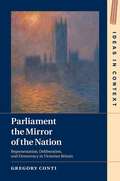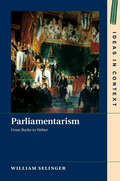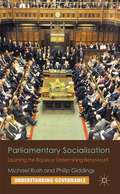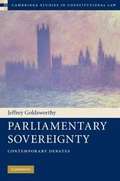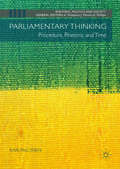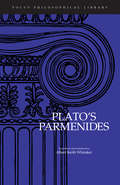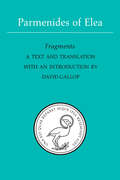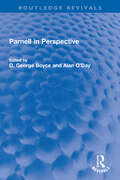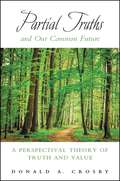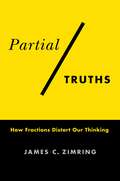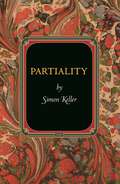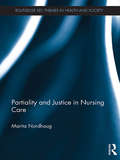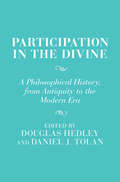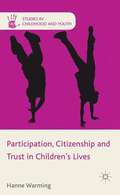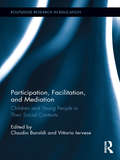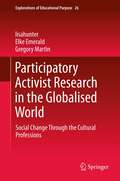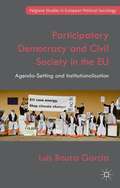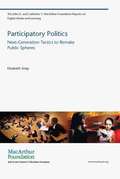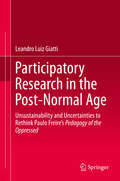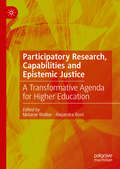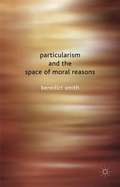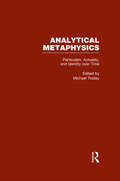- Table View
- List View
Parliament the Mirror of the Nation: Representation, Deliberation, and Democracy in Victorian Britain (Ideas in Context #119)
by Gregory ContiThe notion of 'representative democracy' seems unquestionably familiar today, but how did the Victorian era - the epoch when the modern democratic state was made - understand democracy, parliamentary representation, and diversity? In the famous nineteenth-century debates about representation and parliamentary reform, two interlocked ideals were of the greatest importance: descriptive representation, that the House of Commons 'mirror' the diversity that marked society, and deliberation within the legislative assembly. These ideals presented a major obstacle to the acceptance of a democratic suffrage, which it was widely feared would produce an unrepresentative and un-deliberative House of Commons. Here, Gregory Conti examines how the Victorians conceived the representative and deliberative functions of the House of Commons and what it meant for parliament to be the 'mirror of the nation'. Combining historical analysis and political theory, he analyses the fascinating nineteenth-century debates among contending schools of thought over the norms and institutions of deliberative representative government, and explores the consequences of recovering this debate.
Parliamentarism: From Burke to Weber (Ideas in Context #121)
by William SelingerFor eighteenth- and nineteenth-century authors such as Burke, Constant, and Mill, a powerful representative assembly that freely deliberated and controlled the executive was the defining institution of a liberal state. Yet these figures also feared that representative assemblies were susceptible to usurpation, gridlock, and corruption. Parliamentarism was their answer to this dilemma: a constitutional model that enabled a nation to be truly governed by a representative assembly. Offering novel interpretations of canonical liberal authors, this history of liberal political ideas suggests a new paradigm for interpreting the development of modern political thought, inspiring fresh perspectives on historical issues from the eighteenth to early twentieth centuries. In doing so, Selinger suggests the wider significance of parliament and the theory of parliamentarism in the development of European political thought, revealing how contemporary democratic theory, and indeed the challenges facing representative government today, are historically indebted to classical parliamentarism.
Parliamentary Socialisation
by Michael Rush Philip GiddingsParliament and MPs are held in low esteem at a time when Britain is facing major challenges. Can Parliament change to help meet these challenges? Or are MPs simply socialised into the ways of the Westminster village? Parliamentary Socialisation is the first book-length study of the socialisation of MPs. Surveying the literature on legislative socialisation, it develops a model of parliamentary socialisation as a framework for the book. Using a series of questionnaires covering two Parliaments, the book explores what MPs think about their roles and how they learn their jobs. MPs' patterns of behaviour are explored through analyses of their participation in debates, use of Parliamentary Questions, and committee work. The book concludes that MPs face a steep learning curve when first elected and that they are subject to a considerable degree of socialisation, but also argues that MPs' attitudes and behaviour can and do change.
Parliamentary Sovereignty
by Jeffrey GoldsworthyThis book has four main themes: (1) a criticism of 'common law constitutionalism', the theory that Parliament's authority is conferred by, and therefore is or can be made subordinate to, judge-made common law; (2) an analysis of Parliament's ability to abdicate, limit or regulate the exercise of its own authority, including a revision of Dicey's conception of sovereignty, a repudiation of the doctrine of implied repeal and the proposal of a novel theory of 'manner and form' requirements for law-making; (3) an examination of the relationship between parliamentary sovereignty and statutory interpretation, defending the reality of legislative intentions, and their indispensability to sensible interpretation and respect for parliamentary sovereignty; and (4) an assessment of the compatibility of parliamentary sovereignty with recent constitutional developments, including the expansion of judicial review of administrative action, the Human Rights and European Communities Acts and the growing recognition of 'constitutional principles' and 'constitutional statutes'.
Parliamentary Thinking: Procedure, Rhetoric and Time (Rhetoric, Politics and Society)
by Kari PalonenThe parliamentary style of politics has been formed over centuries; nobody theorised it in advance. This book presents a thought experiment to spell out key principles of the parliamentary ideal type of politics. Max Weber offers the main intellectual inspiration, Westminster parliament provides the main historical reference and the author’s studies on parliamentary procedure and rhetoric provide the background for the book. Parliamentary acting and thinking offer us the best example of politics as a contingent and controversial activity. Using a parliamentary imagination, the author constructs the ideal type in five main chapters: dissensual modes of proceeding; rhetoric of parliamentary debate; parliamentary formation and control of government; parliamentarians as politicians; and parliamentary time as their common subtext. In the last two chapters, the book outlines the possibilities of extending parliamentary judgment to politics beyond parliaments proper and the chances for parliamentary politics succeeding today.
Parmenides
by PlatoThe awe with which Plato regarded the character of 'the great' Parmenides has extended to the dialogue which he calls by his name.
Parmenides (Focus Philosophical Library)
by PlatoThis is an English translation of one of the more challenging and enigmatic of Plato's dialogues between Socrates and Parmenides and Zeno of Elea, that begins with Zeno defending his treatise of Parmenidean monism against those partisans of plurality. Focus Philosophical Library translations are close to and are non-interpretative of the original text, with the notes and a glossary intending to provide the reader with some sense of the terms and the concepts as they were understood by Plato’s immediate audience.
Parmenides of Elea
by David GallopDavid Gallop provides a Greek text and a new facing-page translation of the extant fragments of Parmenides' philosophical poem. He also includes the first complete translation into English of the contexts in which the fragments have been transmitted to us, and of the ancient testimonia regarding Parmenides' life and thought. All of the fragments have been translated in full and are arranged in the order that has become canonical since the publication of the fifth edition of Diels-Rranz's Die Fragmente der Vorsokratiker. Alternative renderings are provided for passages whose meaning is disputed or where major questions of interpretation hinge upon the text or translation adopted. In an extended introductory essay, Gallop offers guidance on the background of the poem, and a continuous exposition of it, together with a critical discussion of its basic argument. The volume also includes an extensive bibliography, a glossary of key terms in the poem, and a section on sources and authorities.
Parnell in Perspective (Routledge Revivals)
by Alan O’Day D. George BoyceFirst published in 1991, Parnell in Perspective is a collection of essays exploring the ideas and political style of Charles Stewart Parnell. Divided into two parts, the book explores Parnell’s career in detail and investigates the parliamentary and personal qualities that led to his reputation as ‘The Uncrowned King of Ireland’. It will appeal to those with an interest in Irish and British political and social history.
Parteienforschung: Ein Überblick
by Elmar WiesendahlDas Buch des bekannten deutschen Parteienforschers Elmar Wiesendahl stellt die Entwicklung, theoretischen Perspektiven, Forschungsansätze und Untersuchungsfelder der Parteienforschung mit Blick auf den aktuellen Diskussionsstand dar.
Parteienwettbewerb und Wählerverhalten im deutschen Mischwahlsystem (Wahlen und politische Einstellungen)
by Anna-Sophie Kurella Franz Urban Pappi Thomas BräuningerDas Buch liefert eine erste umfassende Analyse der komplexen Wechselwirkungen des Wählerverhaltens und der Parteistrategien im deutschen Mischwahlsystem. Nach einer ausführlichen Einführung in die räumliche Theorie des Parteienwettbewerbs wird das Zusammenspiel von Politiknachfrage der Wähler und Politikangebot der Parteien in der Mehrheits- und der Verhältniswahlkomponente bei Bundestagswahlen untersucht. Die Darstellung richtet sich somit an Politikwissenschaftler, Wahlrechtsexperten in Politik und Wissenschaft, Lehrende an Hochschulen und Journalisten gleichermaßen.
Partial Truths and Our Common Future: A Perspectival Theory of Truth and Value (SUNY series in American Philosophy and Cultural Thought)
by Donald A. CrosbyIn this book, Donald A. Crosby defends the idea that all claims to truth are at best partial. Recognizing this, he argues, is a necessary safeguard against arrogance, close-mindedness, and potentially violent reactions to differences of outlook and practice. Crosby demonstrates how "partial truths" are inevitably at work in conversations and debates about religion, science, morality, economics, ecology, and social and political progress. He then focuses on the concept in the discipline of philosophy, looking at a number of distinctions that are taken to be strictly binary—those between fact and value, continuity and novelty, rationalism and empiricism, mind and body, and good and evil—and demonstrates how in all of these cases, each on its own can offer only an incomplete picture. Partial Truths and Our Common Future invites ongoing dialogue with others for the sake of mutual enlargements of understanding rather than mere civility, and provides incentive for continuing open-minded and shared inquiries into the important issues of life.
Partial Truths: How Fractions Distort Our Thinking
by James C. ZimringA fast-food chain once tried to compete with McDonald’s quarter-pounder by introducing a third-pound hamburger—only for it to flop when consumers thought a third pound was less than a quarter pound because three is less than four. Separately, a rash of suicides by teenagers who played Dungeons and Dragons caused a panic in parents and the media. They thought D&D was causing teenage suicides—when in fact teenage D&D players died by suicide at a much lower rate than the national average. Errors of this type can be found from antiquity to the present, from the Peloponnesian War to the COVID-19 pandemic. How and why do we keep falling into these traps?James C. Zimring argues that many of the mistakes that the human mind consistently makes boil down to misperceiving fractions. We see slews of statistics that are essentially fractions, such as percentages, probabilities, frequencies, and rates, and we tend to misinterpret them. Sometimes bad actors manipulate us by cherry-picking data or distorting how information is presented; other times, sloppy communicators inadvertently mislead us. In many cases, we fool ourselves and have only our own minds to blame. Zimring also explores the counterintuitive reason that these flaws might benefit us, demonstrating that individual error can be highly advantageous to problem solving by groups. Blending key scientific research in cognitive psychology with accessible real-life examples, Partial Truths helps readers spot the fallacies lurking in everyday information, from politics to the criminal justice system, from religion to science, from business strategies to New Age culture.
Partiality (Princeton Monographs in Philosophy #40)
by Simon KellerWe are partial to people with whom we share special relationships--if someone is your child, parent, or friend, you wouldn't treat them as you would a stranger. But is partiality justified, and if so, why? Partiality presents a theory of the reasons supporting special treatment within special relationships and explores the vexing problem of how we might reconcile the moral value of these relationships with competing claims of impartial morality. Simon Keller explains that in order to understand why we give special treatment to our family and friends, we need to understand how people come to matter in their own rights. Keller first presents two main accounts of partiality: the projects view, on which reasons of partiality arise from the place that people take within our lives and our commitments, and the relationships view, on which relationships themselves contain fundamental value or reason-giving force. Keller then argues that neither view is satisfactory because neither captures the experience of acting well within special relationships. Instead, Keller defends the individuals view, on which reasons of partiality arise from the value of the individuals with whom our relationships are shared. He defends this view by saying that we must accept that two people, whether friend or stranger, can have the same value, even as their value makes different demands upon people with whom they share different relationships. Keller explores the implications of this claim within a wider understanding of morality and our relationships with groups, institutions, and countries.
Partiality and Justice in Nursing Care (Routledge Key Themes in Health and Society)
by Marita NordhaugPartiality and Justice in Nursing Care examines the conflicting normative claims of partiality and impartiality in nursing care, looking in depth at how to reconcile reasonable concerns for one particular patient with equally important concerns for the maximisation of health-related welfare for all with relevant nursing-care needs, in a resource-limited setting. Drawing on moral philosophy, this book explores how discussions of partiality and impartiality in moral philosophy can have relevance to the professional context of clinical nursing care as well as in nursing ethics in general. It develops a framework for normative nursing ethics that incorporates a notion of permissible partiality, and specifies which concerns an ethics of nursing care should entail when balancing partialist and impartialist concerns. At the same time, Nordhaug argues that this partiality must also be constrained by both principled and context-sensitive assessments of patients’ needs, as well as of the role-relative deontological restriction of minimising harm, something that could be mitigated by institutional and organisational arrangements. This thought-provoking volume is an important contribution to nursing ethics and philosophy.
Participation in the Divine: A Philosophical History, From Antiquity to the Modern Era (Cambridge Studies in Religion and Platonism)
by Douglas Hedley Daniel J. TolanThe concept of participation in a transcendent domain of existence is central to the Platonic and the Judaeo-Christian traditions. It is how thinkers throughout history have justified existence itself, explaining temporal being vis-à-vis God. Yet in the wake of secularisation and the widespread phenomenon of disenchantment, this once ubiquitous and coveted notion has fallen into desuetude. The essays in this volume analyse and explore this key concept in the history of Western thought. They provide, for the first time, a rigorous and accessible account of participation, a pivotal concept in Western philosophy and theology, from antiquity to the modern era. Bringing together contributions by an international team of leading scholars of the Platonic tradition, the volume challenges a standard distinction between philosophy and theology. It also enables a comprehensive understanding of figures who do not fit neatly into the modern university's division of these subjects.
Participation, Citizenship and Trust in Children’s Lives
by Hanne WarmingThis book critically analyzes and theorizes trust dynamics in children's lives and how they impact upon children's participation, citizenship and well-being, drawing on a wealth of empirical evidence that examines trust in various institutional and cultural contexts.
Participation, Facilitation, and Mediation: Children and Young People in Their Social Contexts (Routledge Research in Education)
by Claudio Baraldi Vittorio IerveseTraditionally, children have been considered from a primarily developmental perspective, in need of education in order to achieve autonomy, growth, and eventually adulthood. Childhood studies have recently underlined an alternate way to look at children, starting from the consideration that children are competent social actors and can actively participate in social life. However, there has been relatively little attention paid to the ways in which adults can actively empower children’s agency and participation. This book aims to highlight this important aspect, explaining the position of adults as facilitators and mediators in the process of constructing childhood.
Participatory Activist Research in the Globalised World
by Gregory Martin Elke Emerald LisahunterAction research was conceived as a method of collaborative, self-reflective problem-solving in a community context. Yet many believe it has evolved too far away from its original, directly activist roots. As a direct response to calls for a rejuvenation of the social agenda of 'action research', this volume provides an all-inclusive road map to generating and implementing politically active grass-roots research activities. It is a priceless practical guide for the newly minted researcher wanting to make a tangible difference in their profession and in the world. Where some action research models have been criticized for losing focus on the participatory and social justice roots of this type of research, this book puts social justice activism squarely center stage, guiding the researcher through the theoretical, methodological and practical considerations and constraints of developing, implementing and sustaining research in the cultural professions. Lcating and contextualizing the history and theory of action research, critical theory and other related methodologies and concepts, this volume takes the reader on a journey that begins with the formation of a question, puzzle or research idea right through to the publication of a report on your finished project. Including discrete sections on every stage in the process, from generating a social justice activism agenda, through forming a team and empowering participants, to ensuring the implementation of your agenda and publishing and disseminating your work. Engaging their readers with a fresh acronym, PAtR--Participatory Activist Research--the authors give fresh impetus to those looking for a systematic way to understand and shape practice in their daily work, their profession and their world. This is an outstanding book that represents a critical research process sorely needed in the academy today. Any researcher interested in making an intervention into the egregious social conditions wrought by neoliberal capitalism would do well to read this book. An important contribution to the literature on research methodology. Peter McLaren, Professor, School of Critical Studies in Education, University of Auckland This is an outstanding book that represents a critical research process sorely needed in the academy today. Any researcher interested in making an intervention into the egregious social conditions wrought by neoliberal capitalism would do well to read this book. An important contribution to the literature on research methodology. Peter McLaren, Professor, School of Critical Studies in Education, University of Auckland
Participatory Democracy and Civil Society in the EU
by Luis Bouza GarciaThis book is about both the symbolic and the real struggles for the control of the EU's agenda on participatory democracy in the last fifteen years. The book analyzes how civil society organizations contributed to an agenda which has implications for the regulation of interest groups to the institutions and for the democratic legitimacy of the EU.
Participatory Politics
by Elisabeth SoepAlthough they may disavow politics as such, civic-minded young people use every means and media at their disposal to carry out the basic tasks of citizenship. Through a mix of face-to-face and digital methods, they deliberate on important issues and debate with peers and powerbrokers, redefining some key dynamics that govern civic life in the process. In Participatory Politics, Elisabeth Soep examines the specific tactics used by young people as they experiment with civic engagement. Drawing on her scholarly research and on her work as a media producer and educator, Soep identifies five tactics that are part of effective, equitable participatory politics among young people: Pivot Your Public (mobilizing civic capacity within popular culture engagements); Create Content Worlds (using inventive and interactive storytelling that sparks sharing); Forage for Information in public data archives; Code Up (using computational thinking to design tools, platforms, and spaces for public good); and Hide and Seek (protecting privacy and information sources). After describing these tactics as they manifest themselves in a range of youth-driven activities -- from the runaway spread of the video Kony 2012 to community hackathons -- Soep discusses concrete ideas for cultivating the new literacies that will enable young people to participate in public life. She goes on to consider some risks associated with these participatory tactics, including simplification and sensationalism, and ways to avoid them, and concludes with implications for future research and practice.
Participatory Research in the Post-Normal Age: Unsustainability and Uncertainties to Rethink Paulo Freire's Pedagogy of the Oppressed
by Leandro Luiz GiattiThis book shows how participatory research can provide tools to overcome the current epistemic and ethical challenges faced by traditional scientific approaches. Ever since Funtowicz and Ravetz proposed the notion of post-normal science, there has been a growing awareness of the limits of a form of knowledge production based only on the traditional scientific peer communities that excludes other social groups affected by its results and applications. The growing uncertainty and complexity posed by socio-ecological issues in the interactions between science, society and decision making has revealed the importance of a social quality control over crucial decisions that rely on scientific research and the necessary democratization of knowledge to tackle sustainability and health concerns.Departing from a reinterpretation of Paulo Freire’s Pedagogy of the Oppressed, this volume shows how participatory research can contribute to reconnect science and society by extending peer communities through the incorporation of different forms of knowledge and different social actors into research projects. To do so, the author presents a critical review of different participatory research approaches, identifying the elements that distinguish a true participatory research from a traditional one, and proposing a taxonomy of the various participatory methodologies. The volume also analyzes a diversity of social practices and understandings that deal with an ecology of knowledge and its systemic characteristics. Moreover, it demonstrates that uncertainties can be integrated in dialogical processes that open possibilities for a myriad of outcomes. Participatory Research in the Post-Normal Age - Unsustainability and Uncertainties to Rethink Paulo Freire's Pedagogy of the Oppressed will be of interest to researchers working with participatory approaches in different fields like health, environmental sciences, and education, as well as to practitioners of action research concerned with scientific dilemmas and counter-hegemonic strategies.
Participatory Research, Capabilities and Epistemic Justice: A Transformative Agenda for Higher Education
by Melanie Walker Alejandra BoniThis book explores the potential of participatory research and the capability approach to transform understandings of higher education. The editors and contributors illuminate the importance of epistemic in/justice as a foundation to a reflexive, inclusive and decolonial approach to knowledge, as well as its importance to democratic life and participation in higher education. Drawing together eight global case studies, the authors argue for an ecology of knowledge that expands epistemic capabilities in higher education through teaching, research and policy making. Moreover, the chapters illustrate how these epistemic capabilities can be marginalised by both institutions and structural and historical factors; as well as the potential for possibilities when spaces are opened for genuine participation and designed for a plurality of voices. This book will appeal to scholars of social justice and participatory research as well as ongoing debates around decolonising the academy.
Particularism and the Space of Moral Reasons
by Benedict SmithParticularism and the Space of Moral Reasons critically assesses the startling idea that our moral reasoning does not need to use moral principles. If we don't have principles, how do we work out what to do? This book examines 'moral particularism', a controversial idea at the forefront of contemporary moral theory.
Particulars, Actuality, and Identity over Time, vol 4: Analytical Metaphysics (Analytical Metaphysics Ser. #Vol. 4)
by Michael TooleyVolume 4 in the 5-volume series titled Analytical Metaphysics. The essays in this volume are concerned with three main issues. First, what account can be given of the nature of a particular? Second, is identity over time a basic and irreducible relation, or can it be analysed? If so, what is the correct analysis? Third, what account can be offered of what it is to be actual? The final account of this volume involves the claim that actuality is a special property that is possessed by one, and only one, possible world.
